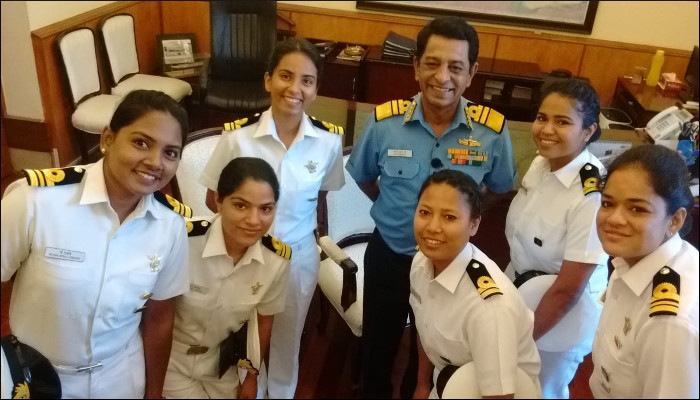New Delhi: The Supreme Court, yet again, took the wrecking ball to patriarchy with its judgment this past week that allowed women in the navy to hold permanent commissions and appointments at par with men.
The ruling shouldn’t come as a surprise. After all, a two-judge bench headed by Justices D.Y. Chandrachud along with Hemant Gupta had just a month earlier brushed aside all the usual objections – it would distract women from their family responsibilities, rank and file would not obey women – to rule that excluding women from top jobs in the army is illegal.
Media celebrated the army judgment with banner headlines. By comparison, reaction to the navy judgment has been muted. Yet, the second one takes the earlier judgment a step further.
It not only confirms women’s ‘just entitlements under law and the right to fair and equal treatment in the workplace’ but exposes systemic exclusion of women in the navy, and grants unprecedented monetary compensation to women officers who lost out on jobs and positions because of it.
“This is in many ways a far more progressive judgment than the earlier army one,” said senior advocate Aishwarya Bhati who was one of the lawyers in both the army and the navy matters.
Women officers have been inducted into the navy since 1991. In 2008, the Ministry of Defence announced that it would grant permanent commission to women who wanted it. But this did not happen on the ground.
Correcting An Injustice
Noting that the denial of permanent commissions to women short service commission (SSC) officers had left them in the lurch, the judgment said that the ‘injustice meted to them by lost years of service and the deprivation of retiral entitlements must be rectified’.
The judges have now ordered the navy to pay pensions to SSC women officers who were denied permanent commissions and are not presently in service. Those who had appealed before the Delhi High Court and Armed Forces Tribunal to be considered for permanent commissions also qualify for pensions and other benefits and five respondents in a special leave petition will receive a one-time compensation of Rs 25 lakh each.
The navy’s claim was that job positions in certain cadres were ‘saturated’ and, therefore, women SSCs were being denied extensions.
The Supreme Court saw through that claim. If women were being denied extensions on grounds of ‘saturation’, how was it that the navy was recruiting fresh hands in the same cadre? Nearly 160 men were recruited in the logistics cadre on permanent commissions, a fact the navy tried to defend on the ground that fresh recruits ‘maintain the youthful profile of the force’. But the Supreme Court was not buying into that argument either. After all, pointed out the judges, the navy was also offering re-employment to superannuated male officers, aged 52 years and above, on grounds of shortage of personnel.
An ‘informal quota has been carved out for male officers to continue in service, even after superannuation’, observed the judges. “It is women officers who are required to exit as a result of the ‘cadre saturation’.”
The navy judgment is significant not because it corrects a historic wrong, which it does, but because it exposes ingrained sexism in the navy. It’s a sexism that comes thinly veiled; in an earlier argument (subsequently prudently dropped), the navy had argued against women on naval ships, many procured from Russia, on the grounds that they did not have separate women’s bathrooms.
“In My Next Birth Too I Will Join The Navy”
Welcoming the decision as the end of a ‘very long journey’, retired Commander E. Prasanna, 48, who joined the navy in 1994 as the only woman officer stationed at INS Rajali, said it was essential to create a level playing field for everyone in the armed forces. “Otherwise, youngsters will prefer to join MNCs and we will lose out on quality personnel,” she said. Prasanna who was represented by advocates Chander Uday Singh, Haripriya and Puja Dhar, is one of the five officers who was granted monetary compensation.
Ironically, the navy has made much of its gender achievements including its first all-woman crew on the INSV Tarini that circumnavigated the globe in 2017. Earlier, in 1993, Commander Ruby Singh became the first Indian woman to lead a platoon in a naval contingent on Republic Day and Sub-lieutenant Shivangi became the first pilot for the navy.
Prasanna, the wife of a tennis coach who has stood by her during her 10-year-long legal battle, says she grew up dreaming of becoming a naval officer. “I have never regretted my choice of career. I only pray that in my next birth too I will join the navy.”
See full Supreme Court judgment here: https://www.livelaw.in/pdf_upload/pdf_upload-371373.pdf
Previously on Article14:
Excluding Women From Top Army Jobs Is Illegal
How 11 Women Officers Made Army History
Why The SC Saluted These Women Army Officers

